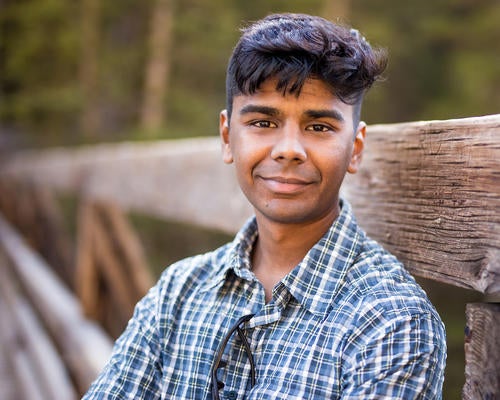
I caught up with Sibi Sutty to see what he has been up to recently. After getting two degrees from UW, he's now doing some exciting work with optical coatings. He's also got a lot of other passions, such as climbing mountains and photography! Thanks for the interview Sibi.
What graduate degree did you do at UW? And when did you complete it?
I finished my M.A.Sc in January 2016. I studied electrical and computer engineering with a specialization in nanotechnology.
What was your undergrad program and where did you do it?
I studied nanotechnology engineering at the University of Waterloo.
Why did you choose UW for graduate school and who was your supervisor?
My undergraduate fourth year design project was about energy harvesting using rectennas which got me interested in new renewable energy technologies. I wanted to continue exploring this field in graduate school. I ultimately chose to go to UW because of my supervisor - Dr. Hany Aziz. He was doing work on organic solar cells at the time. I thoroughly enjoyed his organic electronics course and its blend of materials science and semiconductor physics in undergrad. I thought the field would give me a good blend of academic and industry relevant experience (and I was right for the most part!). Also, Hany had a variety of projects, a strong group of students and access to good research facilities. It was a winning combination that was hard to refuse.
What was your research focus in graduate school?
My graduate research was on organic solar cells (OSCs). Specifically, OSCs made using small-molecule organic semiconductors. In order to make an OSC, thin-films of these small-molecule organic semiconductors are sandwiched between two electrodes. My research was about understanding the relationship between the morphology of these organic semiconductor thin-films and the final device performance.
What were some of the most influential memories you have from your time in grad school?
After the tremendous pressure and breakneck pace of undergrad, grad school was about forging my own identity. In my three years as a grad student, I had a long list of “firsts”:
- First time living alone
- First time traveling alone
- First time snowboarding
- First time running a 5k (and a 10k...barely!)
- First time climbing a massive mountain
- First time pursuing something artistic (photography)
- First time trying scotch
...and the list goes on.
What's a challenge you faced as a graduate student?
My biggest challenge through all of that personal exploration and upheaval was to stay focused and disciplined. This is something that I’ve always struggled with (and continue to struggle with, to some extent). I like the excitement of doing new things so I find it hard to focus on one problem for a long period of time.
Looking back, would you still have gone to graduate school? (Would you have done anything differently?)
Graduate school was one of the pivotal points in my life, so I would absolutely go to graduate school again. However, if I were to do it all over, I would make sure to fully apply myself to anything I set out to tackle, whether it’s a crazy personal venture or a stubborn research problem. I would push myself harder to see all my projects through.
What are you working on now and what is your favourite thing about it?
I’m an optical coatings engineer at Raytheon ELCAN optical technologies. Raytheon ELCAN is one of the largest and most advanced optical design and manufacturing facilities in Canada. I work on a wide variety of projects for defense and commercial applications. My focus is on R&D of new optical coating technologies and process development for new programs. My favourite thing about working here is that I get to learn about all aspects of optics, from design to manufacturing to final assembly.
Where do you see yourself in 5 years? 10 years?
In 5-10 years, I see myself in a R&D role in the optics industry. R&D plays a crucial part in bringing new business and creating new products. I enjoy the excitement and challenge that this role provides.
Has your career path trajectory changed from what you expected while in grad school? If so, how?
When I started graduate school, I was hoping for a career in renewable energy, photovoltaics, or semiconductor fabrication. But when I started looking for a job, I found that my skill-set worked well in the optics industry. It’s a fast-growing industry with applications in almost every field. There are a lot of great optics companies, big to small, in Ontario and rest of North America. I’m really looking forward to staying with this industry for a long time.
What advice do you have for current graduate students?
I think it’s important to get out there and explore as a graduate student. I’d advise students to meet and talk with as many scientists and researchers as possible, even if it’s not immediately related to their own work. It’s just as important to form connections and share ideas as it is to do experiments and publish papers. Get to know the awesome people in the QNC. Go lab to lab and chat with the students there. Who knows what you might be able to create together?
What do you like to do outside of work?
Outside of work, I like to explore and photograph the outdoors. I’ve been itching to go kayaking again once winter is behind us. I’m also excited for my August trip to Mt. Assiniboine in BC!
Is there anything else you would like to add?
Thanks for the opportunity to share my thoughts about graduate school. I can be reached on LinkedIn if anyone would like to connect and chat further: https://www.linkedin.com/in/sibisutty/




